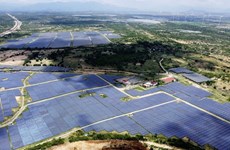Da Nang city expands e-government use
The central city of Da Nang has expanded participation in the city's
E-government system to 16 cities and provinces, following an agreement
signed last week.
The central city of Da Nang has expanded participation in the city's
E-government system to 16 cities and provinces, following an agreement
signed last week.
Director of the city's Information and Communications Department Pham Kim Son said the main documents outlining the basic structure of the system were handed over to provinces and cities including Bac Giang, Bac Ninh, Binh Dinh, Ca Mau, Dak Lak and Dak Nong.
He said the documents, which includes a structure of applications, technical, information security and services, will help administrations of provinces and cities build E-Government services, data centres, and public wireless internet (wifi) systems, as Da Nang successful launched last year.
"It's saving solution for cities and provinces in building up e-Government and Information Technology (IT) applications. We also share with cities and provinces our experiences in operation, management, and IT human resources training for the system," Son said.
As scheduled, Da Nang will support Tien Giang, Soc Trang and Ca Mau in soon lauching e-Government services.
The launch of e-Government systems will provide a Metropolitan Area Network (MAN), wireless internet, data centre and a centre for human training and research on IT applications.
The e-Government system, which is a crucial step towards building a smart city, includes the Information Technology (IT) and communications infrastructure, IT applications, policy and mechanisms for IT and communications and IT manpower resources.
The system will also help improve transparency and efficiency among State agencies, as well as prevent bureaucratic procedural delays.
Da Nang has also offered free wireless internet (wifi) services, with a maximum of 20,000 connections for local residents and tourists at major centres and streets in the city, including living quarters, tourist sites, schools, beaches, hospitals, shopping malls, bus and railway stations, airports and entertainment centres.
The central city had provided 1,196 on-line administration procedures, including one-stop shops, residential management, public transport and water supervision through the E-Government system.-VNA
Director of the city's Information and Communications Department Pham Kim Son said the main documents outlining the basic structure of the system were handed over to provinces and cities including Bac Giang, Bac Ninh, Binh Dinh, Ca Mau, Dak Lak and Dak Nong.
He said the documents, which includes a structure of applications, technical, information security and services, will help administrations of provinces and cities build E-Government services, data centres, and public wireless internet (wifi) systems, as Da Nang successful launched last year.
"It's saving solution for cities and provinces in building up e-Government and Information Technology (IT) applications. We also share with cities and provinces our experiences in operation, management, and IT human resources training for the system," Son said.
As scheduled, Da Nang will support Tien Giang, Soc Trang and Ca Mau in soon lauching e-Government services.
The launch of e-Government systems will provide a Metropolitan Area Network (MAN), wireless internet, data centre and a centre for human training and research on IT applications.
The e-Government system, which is a crucial step towards building a smart city, includes the Information Technology (IT) and communications infrastructure, IT applications, policy and mechanisms for IT and communications and IT manpower resources.
The system will also help improve transparency and efficiency among State agencies, as well as prevent bureaucratic procedural delays.
Da Nang has also offered free wireless internet (wifi) services, with a maximum of 20,000 connections for local residents and tourists at major centres and streets in the city, including living quarters, tourist sites, schools, beaches, hospitals, shopping malls, bus and railway stations, airports and entertainment centres.
The central city had provided 1,196 on-line administration procedures, including one-stop shops, residential management, public transport and water supervision through the E-Government system.-VNA













